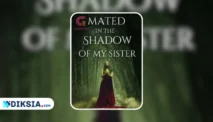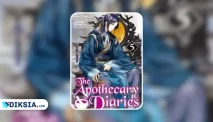Diksia.com - Frankenstein is a classic novel written by Mary Shelley when she was just 18 years old. The story follows Victor Frankenstein, a brilliant scientist who creates a living creature from dead body parts. However, Frankenstein is horrified by his creation and abandons it. The creature, lonely and misunderstood, seeks revenge on Frankenstein and everyone he loves.
The novel is considered to be one of the first works of science fiction, as it explores the consequences of scientific experimentation and innovation. It is also a Gothic horror story, as it creates a dark and gloomy atmosphere of terror, suspense, and mystery. Additionally, Frankenstein is a Romantic masterpiece, as it reflects the personal and social concerns of Mary Shelley and her contemporaries.
In this article, we will review Frankenstein in detail, examining its plot, characters, themes, writing style, and literary significance. We will also compare it to other works of literature and provide some suggestions for where to read the book online.
Whether you are a fan of horror, science fiction, or classic literature, you will find Frankenstein to be a fascinating and rewarding read that will challenge your imagination and your moral sense.
Book Details
- Title: Frankenstein or the Modern Prometheus
- Author: Mary Wollstonecraft Shelley
- Genres: Classics, Horror, Fiction, Science Fiction, Gothic
- Chapters: 24
- Language: English
- Publisher: Lackington Hughes Harding Mavor & Jones
- Publication date: January 1st 1818
- Rating: 3.85 out of 5 stars (based on Goodreads)
- Awards: None
Recommended Audience
Frankenstein or the Modern Prometheus is suitable for readers who enjoy:
- Gothic horror stories with a dark and eerie mood
- Science fiction stories that explore the ethical implications of scientific discoveries
- Romantic stories that express strong emotions and individualism
- Classic literature that has influenced many other works of art and culture
The novel is not recommended for readers who are sensitive to:
- Graphic descriptions of violence and death
- Depictions of suffering and misery
- Themes of alienation and loneliness
- Criticism of religion and society
Overview
Frankenstein is a novel about a young scientist named Victor Frankenstein who creates a sapient creature in an unorthodox scientific experiment. The creature is abandoned by Frankenstein and eventually seeks revenge on him. The novel is told in three parts: a letter from Captain Robert Walton to his sister, a narrative by Victor Frankenstein, and a narrative by the creature.
The novel explores themes of creation, isolation, revenge, and the dangers of scientific hubris. It has been adapted into numerous films, television shows, and stage productions.
Here are some of the key points of the novel:
- Victor Frankenstein is a brilliant scientist who is obsessed with the idea of creating life.
- He creates a sapient creature from dead body parts, but he is horrified by his creation and abandons it.
- The creature is left to fend for itself and eventually becomes vengeful and destructive.
- The creature kills Frankenstein’s brother, his best friend, and his wife.
- Frankenstein pursues the creature across Europe and Asia, but he is never able to destroy it.
- The novel ends with the death of Frankenstein and the creature’s disappearance.
Frankenstein is a classic work of science fiction and horror that has been enjoyed by readers for centuries. It is a complex and thought-provoking novel that explores important themes about the nature of creation, the dangers of scientific hubris, and the destructive power of revenge.
Characters and Character Development
- Victor Frankenstein: The protagonist of the novel, a scientist who creates a living creature from dead body parts. He is driven by a thirst for knowledge and glory, but also by a sense of guilt and responsibility for his creation. He suffers from the consequences of his actions, losing his family, friends, health, and happiness. He dies in pursuit of his creature in the Arctic.
- The Creature: The antagonist of the novel, a human-like being created by Frankenstein. He is intelligent, sensitive, and curious, but also lonely, deformed, and misunderstood. He seeks love and companionship from humans, but is rejected and hated by them. He becomes bitter and vengeful towards Frankenstein and humanity, killing several people who are dear to Frankenstein. He regrets his actions, but feels that he has no choice but to be evil. He dies by burning himself in the farthest north.
- Robert Walton: The narrator of the frame story of the novel, an explorer who rescues Frankenstein in the Arctic. He is ambitious and adventurous, but also compassionate and friendly. He listens to Frankenstein’s story with interest and sympathy, but also with caution and criticism. He learns from Frankenstein’s mistakes, and decides to abandon his quest for the North Pole.
- Elizabeth Lavenza: Frankenstein’s adopted sister and wife, a beautiful and gentle woman who loves Frankenstein dearly. She is supportive and loyal to Frankenstein, but also worried about his health and happiness. She is killed by the creature on her wedding night.
- Henry Clerval: Frankenstein’s best friend since childhood, a cheerful and generous man who studies languages and literature. He is optimistic and adventurous, but also sensible and moral. He cares for Frankenstein when he is ill, and accompanies him on his travels. He is killed by the creature in Ireland.
- Alphonse Frankenstein: Frankenstein’s father, a noble and wealthy man who loves his family deeply. He is kind and generous, but also strict and authoritative. He tries to guide Frankenstein in his studies and his life, but also respects his choices and independence. He dies of grief after Elizabeth’s death.
- Caroline Beaufort Frankenstein: Frankenstein’s mother, a beautiful and gentle woman who marries Alphonse Frankenstein after her father’s death. She is devoted to her husband and children, and adopts Elizabeth as her own daughter. She dies of scarlet fever before Frankenstein leaves for Ingolstadt.
- William Frankenstein: Frankenstein’s youngest brother, a sweet and innocent boy who adores Frankenstein. He is killed by the creature in the woods near Geneva.
- Justine Moritz: A young girl who works as a servant for the Frankenstein family, and is treated as one of them. She is kind and virtuous, but also timid and submissive. She is accused of killing William, and confesses under pressure from a priest. She is executed for a crime she did not commit.
- M. Krempe: A professor of natural philosophy at Ingolstadt University, who teaches Frankenstein. He is rude and sarcastic, and mocks Frankenstein’s interest in the ancient natural philosophers. He advises Frankenstein to study modern science instead.
- M. Waldman: A professor of chemistry at Ingolstadt University, who teaches Frankenstein. He is kind and eloquent, and inspires Frankenstein to pursue his studies in chemistry and anatomy. He praises Frankenstein’s talent and ambition, but also warns him of the dangers of science without morality.
- The De Lacey Family: A family of cottagers who live near the forest where the creature hides. They consist of De Lacey, an old blind man who plays the guitar; Felix, his son who works as a farmer; Agatha, his daughter who takes care of the household; and Safie, a Turkish woman who loves Felix and learns French from him. The creature observes them from a distance, and learns to speak and read from them. He admires their virtues and their happiness, but also feels their poverty and their sorrow. He tries to befriend them, but they are terrified by his appearance and drive him away.
- Mr. Kirwin: A magistrate in Ireland, who arrests Frankenstein for Clerval’s murder. He is fair and compassionate, and treats Frankenstein with respect and kindness. He arranges for Frankenstein’s father to come from Geneva, and helps to prove his innocence.
Theme and Message
Frankenstein or the Modern Prometheus explores several themes and messages that are relevant to both the personal and social context of Mary Shelley and her readers. Some of the major themes and messages are:
The dangers of ambition and obsession
The novel shows how ambition and obsession can lead to tragic consequences, both for the individual and for society. Frankenstein’s ambition to create life leads him to neglect his family, friends, health, and morality, and to unleash a creature that causes death and destruction. The creature’s obsession with finding love leads him to kill innocent people and to torment his creator. Walton’s obsession with reaching the North Pole leads him to endanger his crew and his life.
The responsibility of creation
The novel shows how creation entails responsibility, both for the creator and for the creation. Frankenstein’s responsibility as a creator is to care for his creature, to teach him right from wrong, to provide him with companionship, and to accept him as he is. The creature’s responsibility as a creation is to respect his creator, to obey his commands, to learn from his mistakes, and to use his abilities for good.
The nature of humanity
The novel shows how humanity is defined by both nature and nurture, by both appearance and behavior, by both reason and emotion. The creature is human by nature, as he is made of human parts and has human faculties. However, he is not human by nurture, as he is rejected by his creator and by society, and has no education or culture. He is also not human by appearance, as he is deformed and monstrous. However, he is human by behavior, as he shows intelligence, curiosity, sympathy, and remorse. He is also human by emotion, as he feels joy, sorrow, anger, and love.
The role of women
The novel shows how women are oppressed and marginalized in a patriarchal society, and how they are valued only for their beauty, gentleness, and domesticity. The female characters in the novel are passive, submissive, and dependent on men. They have no voice or agency of their own. They are often sacrificed or victimized for the sake of the male characters. For example, Caroline dies to save Elizabeth from scarlet fever; Justine dies to save Frankenstein from revealing his secret; Elizabeth dies to satisfy the creature’s revenge; the female creature dies to prevent the possibility of a new species.
The effects of isolation and alienation
The novel shows how isolation and alienation can cause suffering and misery, both for the individual and for society. Frankenstein isolates himself from his family, friends, and society in order to pursue his studies and his creation. He alienates himself from his creature by abandoning and rejecting him. He suffers from guilt, remorse, fear, and loneliness. The creature isolates himself from humans because of his appearance and his actions. He alienates himself from his creator by killing his loved ones. He suffers from ignorance, hatred, despair, and rage.
Writing Style
Frankenstein or the Modern Prometheus is written in a formal and eloquent style that reflects the education and culture of Mary Shelley and her characters. The novel uses complex sentences, rich vocabulary, figurative language, and literary allusions to create a vivid and expressive narration. The novel also uses different modes of writing, such as letters, journals, speeches, dialogues, descriptions, and reflections to convey different perspectives and emotions.
The novel is influenced by various literary genres and traditions that were popular in the late 18th and early 19th centuries. Some of these genres and traditions are:
Gothic
A genre of literature that originated in the 18th century and features elements of horror, mystery, suspense, and the supernatural. The novel uses Gothic elements such as dark settings (castles, graveyards, laboratories), grotesque characters (the creature), sublime scenes (the Alps, the Arctic), supernatural events (the animation of the creature), secrets (Frankenstein’s technique), curses (the creature’s threat), and violence (the murders).
Science Fiction
A genre of literature that originated in the 19th century and features elements of science, technology, innovation, and speculation. The novel uses science fiction elements such as scientific theories (the cause of life), scientific experiments (the creation of the creature), scientific discoveries (electricity), scientific inventions (the creature), scientific consequences (the creature’s actions), scientific ethics (Frankenstein’s responsibility), and scientific warnings (Frankenstein’s message).
Romanticism
A movement of literature that originated in the late 18th century and features elements of emotion, imagination, individualism, and nature. The novel uses romantic elements such as emotional expression (Frankenstein’s and the creature’s feelings), imaginative creation (the creature), individual quest (Frankenstein’s and Walton’s ambitions), and natural beauty (the landscapes).
Pros and Cons
Frankenstein or the Modern Prometheus is a novel that has many strengths and weaknesses, depending on the reader’s preferences and expectations. Some of the pros and cons of the novel are:
Pros:
- It is a classic novel that has influenced many other works of literature and culture, such as Dracula, The Strange Case of Dr. Jekyll and Mr. Hyde, The Island of Dr. Moreau, Jurassic Park, Blade Runner, The Terminator, etc.
- It is a novel that raises important and relevant questions about the nature and limits of science, the responsibility and consequences of creation, the definition and value of humanity, the role and oppression of women, the effects and causes of isolation and alienation, etc.
- It is a novel that offers a complex and nuanced perspective on the characters and events of the story, as it uses different narrators, modes, genres, and traditions to create a rich and diverse narration.
- It is a novel that appeals to different tastes and interests, as it combines elements of horror, science fiction, romance, and classic literature.
Cons:
- It is a novel that can be difficult to read and understand, as it uses a formal and eloquent style that may be unfamiliar or boring to some readers. It also uses complex sentences, rich vocabulary, figurative language, and literary allusions that may require some background knowledge or research to appreciate.
- It is a novel that can be depressing and disturbing, as it depicts graphic scenes of violence and death, as well as themes of suffering and misery. It also portrays a bleak and pessimistic view of human nature and society, where there is no hope or happiness for anyone.
- It is a novel that can be inconsistent and unrealistic, as it contains some plot holes, contradictions, coincidences, and exaggerations that may challenge the reader’s suspension of disbelief. It also relies on some outdated or inaccurate scientific theories or facts that may undermine the credibility of the story.
Comparison to Other Works
Frankenstein or the Modern Prometheus can be compared to other works of literature that share some similarities or differences with it. Some of these works are:
Paradise Lost by John Milton
An epic poem that tells the story of Satan’s rebellion against God, his temptation of Adam and Eve, and their expulsion from Eden. The poem is one of the main sources of inspiration for Frankenstein or the Modern Prometheus, as it explores similar themes such as creation, responsibility, rebellion, free will, and evil. The creature reads the poem and identifies with both Satan and Adam, as he feels both pride and despair, both power and weakness, both love and hate.
The Rime of the Ancient Mariner by Samuel Taylor Coleridge
A lyrical ballad that tells the story of a mariner who kills an albatross and brings a curse upon himself and his shipmates. The ballad is another source of inspiration for Frankenstein or the Modern Prometheus, as it explores similar themes such as guilt, remorse, punishment, and redemption. The creature reads the ballad and relates to the mariner, as he feels both sorrow and sympathy, both regret and resentment, both curse and blessing.
Dracula by Bram Stoker
A novel that tells the story of Count Dracula, a vampire who travels from Transylvania to England in search of new victims. The novel is influenced by Frankenstein or the Modern Prometheus, as it uses similar elements such as Gothic horror, science fiction, frame story, multiple narrators, and epistolary form. The novel also explores similar themes such as life and death, science and superstition, good and evil, and isolation and alienation.
Brave New World by Aldous Huxley
A novel that tells the story of a futuristic society where humans are genetically engineered and conditioned to fit into a rigid caste system. The novel is influenced by Frankenstein or the Modern Prometheus, as it uses similar elements such as science fiction, scientific experimentation, scientific consequences, and scientific ethics. The novel also explores similar themes such as creation and responsibility, humanity and nature, individualism and conformity, and happiness and misery.
Where To Read Book
Frankenstein or the Modern Prometheus is a public domain book that can be read online for free on various websites. Some of these websites are:
- Project Gutenberg: A website that offers over 60,000 free ebooks in various formats. The website has several editions of Frankenstein or the Modern Prometheus, including the original 1818 edition and the revised 1831 edition. The website also has audio versions of the book.
- Internet Archive: A website that offers over 20 million free books, movies, music, and more. The website has several editions of Frankenstein or the Modern Prometheus, including scanned copies of printed books and digital copies of ebooks. The website also has audio versions of the book.
- LibriVox: A website that offers over 15,000 free audiobooks in various languages. The website has several audio versions of Frankenstein or the Modern Prometheus, read by volunteers from around the world.
- Lit2Go: A website that offers over 3,000 free audiobooks and poems in various genres. The website has an audio version of Frankenstein or the Modern Prometheus, read by a professional narrator.
Conclusion
Frankenstein or the Modern Prometheus is a classic novel that has stood the test of time. It is a complex and thought-provoking novel that explores important themes about the nature of creation, the dangers of scientific hubris, and the destructive power of revenge. The novel has been adapted into numerous films, television shows, and stage productions, and it continues to be enjoyed by readers of all ages.
- Frankenstein is a novel that is still relevant today. The themes of the novel, such as the dangers of scientific hubris and the destructive power of revenge, are still relevant in the 21st century.
- Frankenstein is a novel that has had a lasting impact on popular culture. The novel has been adapted into numerous films, television shows, and stage productions, and it continues to be referenced in popular culture.
- Frankenstein is a novel that is worth reading for its literary merits. The novel is well-written and suspenseful, and it explores complex themes in a thought-provoking way.
If you are looking for a novel that will entertain, educate, and inspire you, Frankenstein or the Modern Prometheus is the perfect choice for you. You can read it online for free on various websites, or buy a printed or digital copy from your favorite bookstore. You can also listen to it as an audiobook on various websites, or watch it as a movie or a TV show on various platforms. Whatever format you choose, you will not regret reading Frankenstein or the Modern Prometheus, as it is a novel that will stay with you for a long time.






